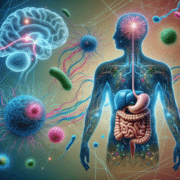"The Role of the Microbiome in Chronic Disease: What You Need to Know"
The Role of the Microbiome in Chronic Disease: What You Need to Know
When it comes to chronic disease, the role of the microbiome cannot be overlooked. The microbiome is a complex ecosystemA blockchain sports ecosystem refers to a network or environment where various stakeholders within the sports industry u... More of bacteria, viruses, fungi, and other microorganisms that reside in our bodies, particularly in the gut. These microorganisms play a crucial role in maintaining our overall health and well-being, and disruptions in the microbiome can have far-reaching effects on our health.
What is the Microbiome?
- The microbiome is the collection of microorganisms that live in and on our bodies.
- It is made up of bacteria, viruses, fungi, and other microbes.
- The gut microbiome is particularly important, as it plays a key role in digestion, immunity, and overall health.
How Does the Microbiome Impact Chronic Disease?
Research has shown that the microbiome plays a significant role in the development and progression of chronic diseases such as:
- Obesity
- Diabetes
- Heart disease
- Autoimmune disorders
- Neurological conditions
Key Points to Consider:
- Imbalances in the microbiome can lead to inflammation, which is a common factor in many chronic diseases.
- The microbiome helps regulate metabolism and nutrient absorption, which can impact weight gain and obesity.
- Disruptions in the gut microbiome have been linked to autoimmune disorders and allergies.
It is clear that maintaining a healthy microbiome is essential for preventing and managing chronic disease.
How Can You Support a Healthy Microbiome?
There are several steps you can take to promote a healthy microbiome and reduce your risk of chronic disease:
- Eat a diverse range of foods, including plenty of fruits, vegetables, whole grains, and lean proteins.
- Avoid processed foods and added sugars, which can disrupt the balance of your microbiome.
- Take probioticsProbiotics are live microorganisms, typically bacteria or yeast, that provide health benefits when consumed in adequate ... More or eat fermented foods like yogurt, kefir, and sauerkraut to promote the growth of beneficial bacteria.
- Manage stress through activities like yoga, meditation, and deep breathing exercises.
Conclusion:
Understanding the role of the microbiome in chronic disease is crucial for maintaining optimal health. By supporting a healthy microbiome through diet, lifestyle, and supplementation, you can reduce your risk of developing chronic conditions and improve your overall well-being.








